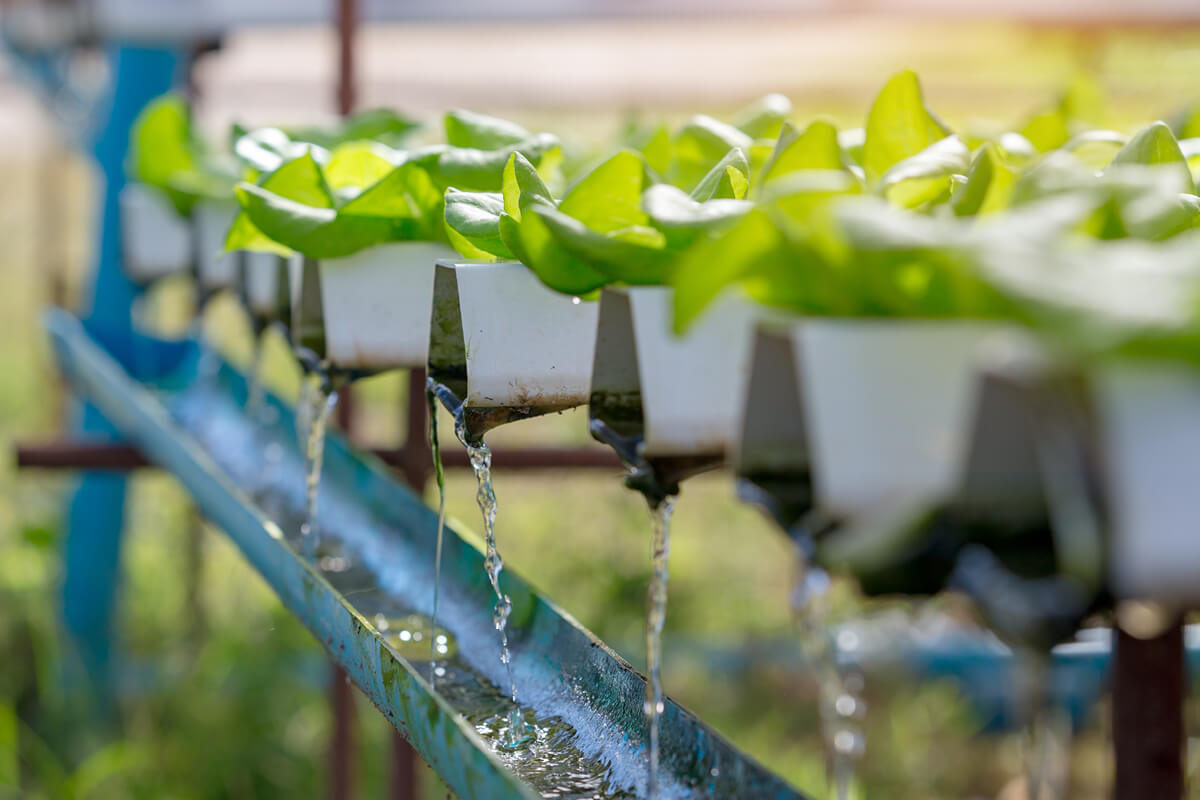You can use tapwater for hydroponics but the tapwater has to be processed first. Since hydroponic plants get all their nutrients from the water, it is important that the water does not contain anything that could damage the plants.
Hydroponic systems cannot survive without water but the type of water used makes a significant impact on the plant growth. Read on to learn more about the effect of water on hydroponics and whether tapwater is suitable.
Why Water Is Important in Hydroponics?
Hydroponics is a planting system whereby plants gain their nutrients from water, instead of from the soil. With the absence of soil, every single nutrient and chemical that is in the water will be absorbed by the plant.
One of the advantages of this type of horticulture is that it is more efficient. In traditional horticulture, the soil acts like a filter or carrier for plant nutrients but it is not an essential component.
By keeping the plants in nutrient-rich water, the roots can absorb the necessary nutrients directly. This allows for faster and bigger growth but it also protects the plants from diseases that could occur in soil.
Since there is no filtering agent that would prevent unwanted nutrients from being absorbed by the roots, the contents of water becomes even more important. For successful hydroponics, you have to know exactly what is in the water.
What Kind of Water Do You Use for Hydroponics?
In theory, you can use any type of water for hydroponics but each type will affect the plants differently. Also, depending on the kind of water, it may have to go through processing before it can be fed into the hydrponic system to remove any unwanted elements.
The types of water that you can use in hydroponics (with processing) are:
- Rainwater
- Tap water
- Distilled water
- Well water
- Filtered water
Regardless of the type of water being used, nutrients need to be added to it to feed the plants. These are essentially the same as fertilizers.
Hydroponic nutrient mixes contain any of the following or a combination of the following:
- Nitrogen, phosphorus, potassium (N-P-K)
- Calcium nitrate
- Magnesium sulfate
These nutrients can come in both liquid and solid form. Often, some mixing is required before adding the nutrients to the system.
On average, hydroponic systems are fed with nutrients every 7 – 10 days depending on the nutrient mixture and the uptake of the plants. In between these feeding sessions, more distilled water may be added to the system, if necessary.
Which Is Better: Distilled Water vs Tap Water
The issue with using tap water for hydroponics is that tap water has been treated. Public utilities companies will process the water so that it is safe for human consumption.
Often, chemicals such as chlorine are added to kill bacteria and other harmful pathogens. Although this does make the water safe for drinking, it also adjusts its pH level.
In hydroponics, the pH level of the water is very important for 2 reasons.
- The water pH level impacts how the nutrients react in the water
- The water pH level can affect plant growth
Ideally, the water you use in hydroponics is pH neutral, a pH level of 7. A neutral pH level won’t affect the nutrients and the plant itself but slightly more acidic or alkaline water would.
The chemicals added to tap water affect the pH level so that it is no longer pH neutral. Distilled water, on the other hand, is pH neutral and so the best option for hydroponics.
Harmful Elements in Tap Water
As mentioned, there are certain chemicals in tap water that are not beneficial to your hydroponic plants. These are the potentially damaging chemicals found in tap water.
- Chlorine: Chlorine kills all microorganisms in tap water, including the microorganisms that are beneficial for plants. Thus, adding chlorine removes certain nutrients that are useful for hydroponics.
- Chloramines: An even stronger version of chlorine that is also known to kil fish and amphibians.
- Calcium and Magnesium: Although calcium and magnesium can be beneficial nutrients for plants, the molecules found in tap water are often too large for plant roots to absorb. These compounds can also damage hydroponic systems when there are too high concentrations in the water.
- Fluoride: High concentrations of fluoride prevent plant enzymes from working and can prevent seed germination.
Depending on the type of chemical or harmful nutrient, there are ways to remove them from tap water. Popular methods include;
- Reverse osmosis system
- Distillation
- (carbon) Filtration
If tap water has been properly processed to remove harmful substances and return it to pH neutrality, it is safe for use in hydroponics. Even with the cost of the processing system, tap water is still one of the most affordable sources of fresh water.
Frequently Asked Questions:
What Is the Best Water to Use for Hydroponics?
The best water to use for hydroponics is distilled water because it is pH neutral and does not contain any harmful elements that could hurt the hydroponics.
Do Plants Grow Better with Tap Water or Distilled Water?
There is no definitive answer to whether tap water or distilled water is better for plants. It depends on the type of plant, the contents of the water and how the plants are being grown.
Is Filtered Water the Same as Distilled Water?
Filtered water is not the same as distilled water. There are no nutrients remaining in distilled water while filtered water may still contain some of the nutrients, the nutrients that were not filtered out.
Summary
Tap water can be used in hydroponic system but the water should go through processing first. It is important to remove chlorine, chloramines, calcium, magnesium, fluoride and other harmful elements from tap water before feeding it into a hydroponic system.
Distilled water is still the best type of water for hydroponic systems but there is no reason why you can’t distill tap water so that it has pH neutrality and no harmful chemicals left in it.



